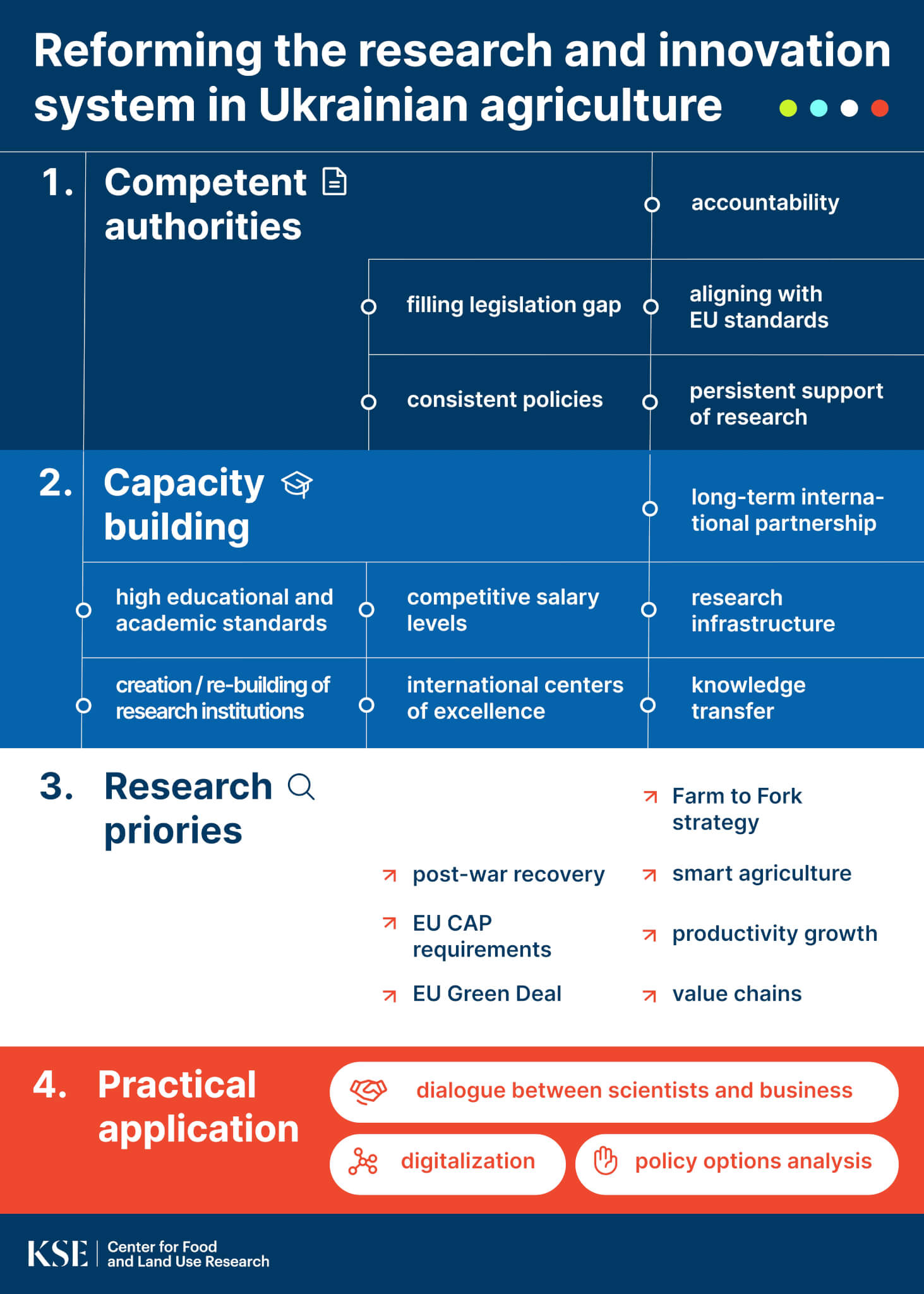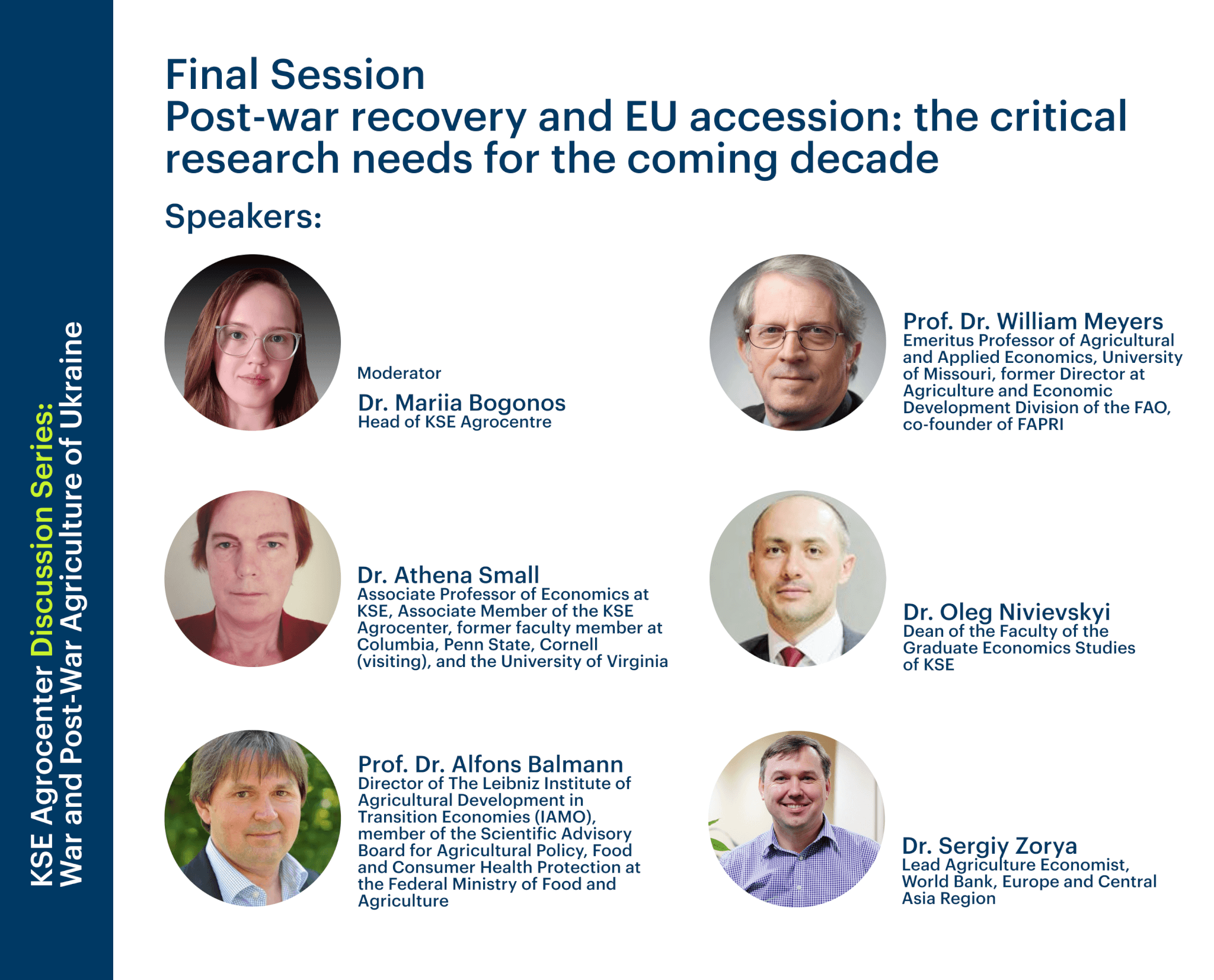- Kyiv School of Economics
- About the School
- News
- KSE Agrocenter Discussion Series Discussion 5: Post-war recovery and EU accession: the critical research needs for the coming decade
KSE Agrocenter Discussion Series Discussion 5: Post-war recovery and EU accession: the critical research needs for the coming decade
21 Грудня 2023

On December 15, 2023, the Center for Food and Land Use Research at the Kyiv School of Economics (KSE Agrocenter) organized the seminar «Post-war recovery and EU accession: the critical research needs for the coming decade».
In the beginning of the seminar, Dr. Mariia Bogonos summarized previous seminars within the KSE Agrocenter Discussion Series and announced the last seminar dedicated to the needs of agricultural research. Dr. Athena Small emphasized that the importance of research in Ukrainian agriculture increased because of the war, as the sector became one of the central drivers of the national economy.
Dr. Oleg Nivievskyi, Dean of the Faculty of the Graduate Economics Studies of KSE.
Main points:
• The task of economists is not to predict the future, but to investigate the factors that allow creating the right environment for economic development.
• Dysfunctional research and educational landscape do not match with economic growth and overcoming political challenges.
• Contribution of Ukrainian agricultural researchers to the world academic market remain miserable, especially compared to the role of Ukraine as the global food supplier. For example, in the Congress of European Association of Agricultural Economists (EAAE Congress) in 2021, only 7 papers with authors from Ukraine were presented out of around 700 papers (around 1%); 4 of them were from KSE Agrocenter. In EAAE Congress 2023, 10 papers with authors from Ukraine out of around 1000 papers (around 1%) were presented; 5 papers were from KSE Agrocenter.
• The low presence of Ukrainian agricultural economists on the global academic market is part of a broader problem of the outdated system of research and education in Ukraine. The scientific potential of Ukraine is undermined, in particular, by the low level of secondary education. For example, the results of the PISA 2022 exam in Ukraine were significantly lower than the average level of OECD countries.
• There are several ways to improve the local scientific and educational system: creation of laboratories as points of connection between science and industry; communication with international partners; long-term investment in capacity development.
Prof. Dr. Willi Meyers, Emeritus Professor of Agricultural and Applied Economics, University of Missouri, former Director at Agriculture and Economic Development Division of the FAO, co-founder of FAPRI.
Main points:
• The transformation of the Ukrainian research and educational system should be coordinated with the priorities arising from the accession to the EU.
• Ukraine will face gradual way of reforming research system following the same way as new EU members (countries of Eastern Europe).
• Consistency in agricultural policy is required to adopt agricultural research system to the international standards and local needs of the sector.
Prof. Dr. Alfons Balmann, Director of The Leibniz Institute of Agricultural Development in Transition Economies (IAMO), member of the Scientific Advisory Board for Agricultural Policy, Food and Consumer Health Protection at the Federal Ministry of Food and Agriculture
Main points:
• Ukraine has a competitive advantage over many other countries in the process of digitization. The rapid implementation of modern technologies in Ukrainian agricultural research and business can give insentives to the development of the industry.
• The prospects for the post-war recovery of Ukraine’s agriculture are significant. The main directions of such development are: covering gaps in productivity (increasing yields, overcoming climate challenges); huge potential in deepening value chains (food industry, bioeconomy) and in opening new international markets.
• The main bottlenecks in the development of agricultural research in Ukraine are human capital, state research infrastructure, private and state investments, high environmental standards of the EU and international food chains.
• Ukrainian policymakers should take into account the concerns of European states regarding the loss of competitiveness of Ukrainian agriculture during the accession to the EU.
• There is research related to agricultural policy in Ukraine, but research on Ukrainian farming is not enough to cover the needs of local agribusiness.
• The main areas of agricultural research will be the development of value chains, digitalization, land markets, agri-environmental economics and policy with a special emphasis on the EU Common Agricultural Policy (CAP), rural development.
• Today’s universities are rather colleges or universities of applied sciences with the following problems: low level of theoretical and methodological competence, continued exploitation of the younger generation, non-competitive salary levels.
• In reforming the agricultural research system, policymakers should move from a short-term, ad-hoc basis to a long-term systemic approach. For the international transfer of knowledge, it is necessary to create special platforms. In particular, the centers of excellence in Ukraine are needed (for example, the IAMO office in Kyiv).
• Two-way knowledge transfer is the key to success in agricultural research. The import of knowledge to Ukraine may include the creation of independent research farms and educational institutions. At the same time, the export of knowledge from Ukraine to the rest of the world can include digitization and production practices in large-scale agriculture.
Dr. Sergiy Zorya, Lead Agriculture Economist, World Bank, Europe and Central Asia Region
Main points:
• Localization of research is important for the implementation of relevant policy support programs. Local authorities have limited trust in foreign researchers.
• The most important part is the results of the policy options. From a policy perspective, this is the difference between good and excellent research.
• Ukraine’s accession to the EU should be a priority to fill the gap between Ukrainian and EU policies.
• Ukrainian policymakers should take into account the experience of new member states, such as the Western Balkans. Meanwhile, the ongoing reform of the EU CAP creates new challenges for Ukraine.
• The most important topic of the study will be the implementation of the EU cross-compliance policy for crop and livestock farming in Ukraine. This implementation is particularly difficult for the livestock sector, which can lead to a 30-40% reduction in livestock from pre-accession levels.
• The new agriculture is not only about low costs and competitiveness, but also about quality and safety. Greening of agriculture will be a trend for decades to come.
At the start of the panel discussion, Dr. Athena Small asked how to get policymakers to understand an effective way to reform the agricultural research system. According to Dr. Sergiy Zorya, filling the legal gap between Ukraine and the EU is particularly important. The most difficult thing in reforming is building competent authorities. For this, the Ukrainian government should invest in transparency and accountability in various policy areas, in particular, in agriculture. Professor Dr. Alfons Balmann added that restructuring the authorities requires not only money, but also human resources. In terms of accountability, it is not easy for Ukraine to follow the path of EU countries. For example, the EU Farm Accounting Data Network (FADN) may not be relevant to Ukrainian agriculture due to the complexity of the data collection process. Instead, Ukraine could invest in intelligent reporting in agriculture using a decentralized approach.
After that, Dr. Oleg Nivievskyi asked what the key success factors are in reforming the agricultural research system. Prof. Dr. Willi Meyers noted that digitization can help create practical applications of science. Two-way communication between farmers and scientists is important in this regard. In addition, the war reinforced the importance of using regenerative agriculture methods, which would be very effective in the post-war recovery period. According to Dr. Sergiy Zorya, private initiatives are effective in the short term, and reforming the agricultural research institution should begin now. It will take decades. Accession to the EU does not guarantee rapid development of domestic scientific systems. The experience of new member states shows that research can remain underdeveloped for decades after joining the EU. Prof. Dr. Alfons Balmann emphasized that low capacity is the main problem of reforming agricultural research systems. In addition, common terminology is very important in international communication in research. This problem could be solved by long-term partnership and synchronization of educational programs with EU countries.
In general, the seminar made it possible to determine the main directions of reforming the system of agricultural education and science in Ukraine.

